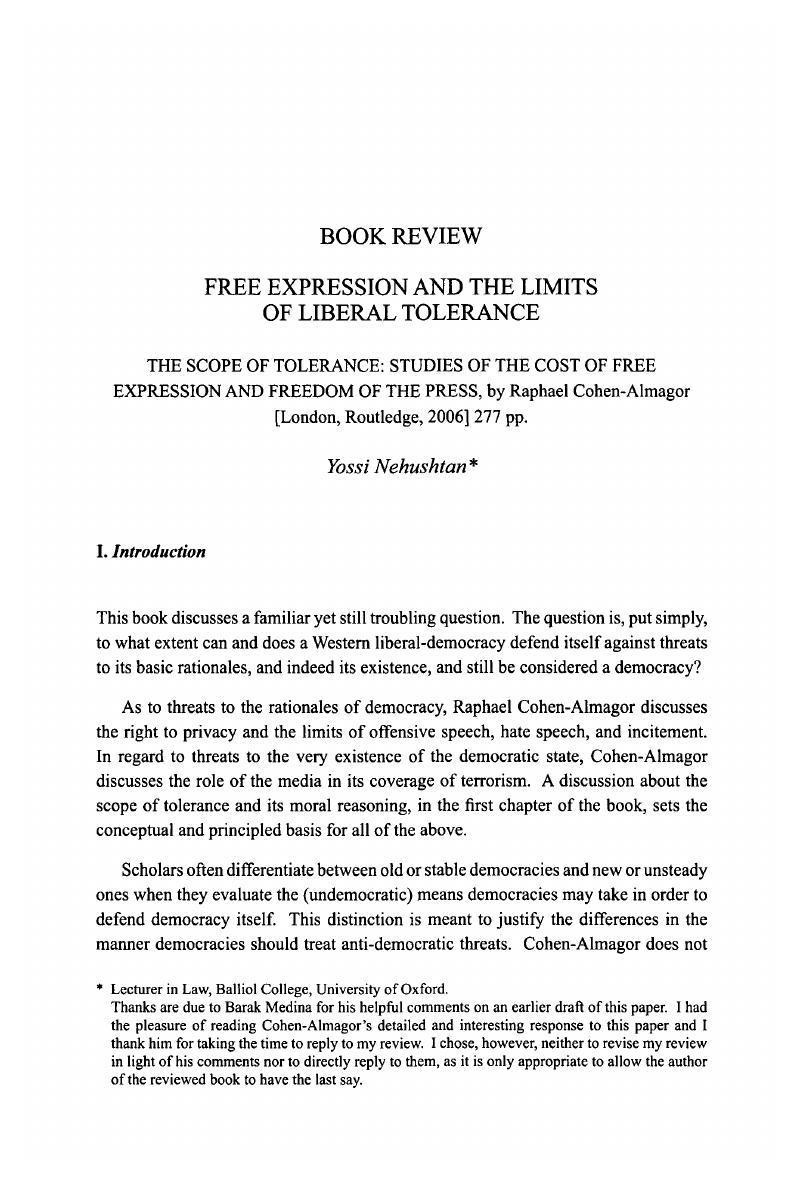No CrossRef data available.
Article contents
Free Expression and the Limits of Liberal Tolerance - The Scope of Tolerance: Studies of the Cost of Free Expression and Freedom of the Press, by Raphael Cohen-Almagor [London, Routledge, 2006] 277 pp.
Published online by Cambridge University Press: 04 July 2014
Abstract

- Type
- Book Review
- Information
- Copyright
- Copyright © Cambridge University Press and The Faculty of Law, The Hebrew University of Jerusalem 2007
Footnotes
Lecturer in Law, Balliol College, University of Oxford.
Thanks are due to Barak Medina for his helpful comments on an earlier draft of this paper. I had the pleasure of reading Cohen-Almagor's detailed and interesting response to this paper and I thank him for taking the time to reply to my review. I chose, however, neither to revise my review in light of his comments nor to directly reply to them, as it is only appropriate to allow the author of the reviewed book to have the last say.
References
1 The Scope of Tolerance: Studies on the Costs of Free Expression and Freedom of the Press 2 (2006)Google Scholar.
2 Id. see the Series editors' preface, at x-xi.
3 Parts of my comments to Cohen-Almagor's perception of tolerance and its limits are based on my account of these issues as was elaborated in Nehushtan, Yossi, The Limit of Tolerance: A Substantive-Liberal Perspective, Ratio Juris (forthcoming 2007)Google Scholar. Apart from mentioning this reference I will refrain from referring the reader to specific pages in that paper that deal in great detail with some of the issues that would be discussed hereinafter.
4 Cohen-Almagor, supra note 1, at 26-27.
5 Here, and only for the purpose of this Paper, I distinguish between having authority and having power, though there is no indication to such a distinction in Cohen-Almagor's discussion. According to this distinction “a person has authority either if he is regarded by others as having authority or if he should be so regarded”: Raz, Jospeh Practical Reasons and Norms 62–63 (2nd ed. 1999)CrossRefGoogle Scholar. To regard a person as having authority is to regard at least some of his orders or advice as exclusionary reasons or, to put it differently, to regard some of his utterances as authoritative even if wrong on the balance of first order reasons (Raz, id. at 64-65). Having power, on the other hand, is merely having the ability to coerce or to enforce one's will by physical means or by threat.
6 Cohen-Almagor, supra note 1, at 8.
7 Id. at 28.
8 Id. at 33.
9 Id. at 29-33.
10 Id. at 31.
11 Id. at 31.
12 Id. at 22 & 26 he provides interesting reasons for this phenomenon which I will not repeat here.
13 Id. at 1.
14 Popper, Karl, The Open Society and Its Enemies 265 (1945)Google Scholar. This quotation is not mentioned in Cohen-Almagor's book.
15 See Nehushtan, supra note 3.
16 Cohen-Almagor, supra note 1, at 113.
17 Id. at 24.
18 Id. at 25.
19 Id. at 10 & see also 77.
20 Id. at 107.
21 Id. at 118.
22 Id. at 79-81.
23 Id. at 4 & 79.
24 Id. at 77.
25 Id. at 80.
26 Id. at 113.
27 For some reason Cohen-Almagor describes it as “indecent exposure of their bodies,” a description that is, in my view, highly controversial. See Cohen-Almagor, supra note 1, at 121-122.
28 Id. at 122.
29 Id. at 118.
30 Id. at 119.
31 Id. at 114.
32 Id. at 113.
33 Id. at 80.
34 Id. at 113.
35 Id. at 127.
36 Id.at 148.
37 C.f. id. at 10 & 22.
38 Id. at 22.




